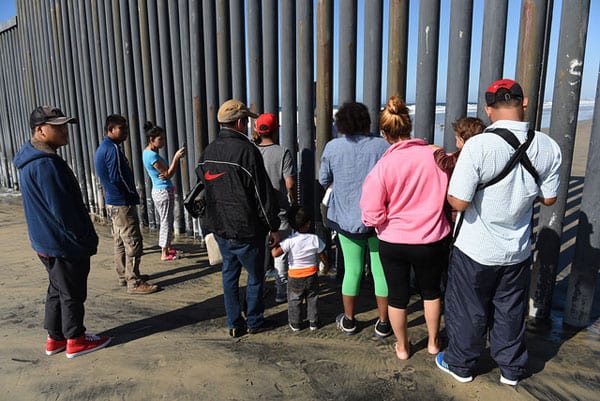
February 16, 2019; New York Times, and February 14, 2019; Willamette Week
As the border wall fight rages on, the Trump administration has quietly begun enforcing its Migrant Protection Protocols, forcing many asylum seekers, including families fleeing violence in Honduras, El Salvador, and Guatemala, to remain in Mexico throughout the duration of their asylum cases—a process that can take years. On February 14, the Innovation Law Lab (ILL), a Portland, Oregon-based nonprofit, filed a lawsuit challenging the policy.
ILL is a hub of resistance to the administration’s immigration policies, providing not only legal assistance to asylum seekers but harnessing technology to design systems to support attorneys around the country helping refugees protect their legal rights and pursue asylum cases.
In their 2018 impact report, ILL uses powerful language to capture the meaning of the last year to an organization fighting for asylum seekers:
2018 will forever be remembered for the federal government’s unrelenting attacks on the rights of immigrants and refugees—from separating parents and children at the border, to detaining asylum seekers in federal prisons, to reversing legal precedents that protected victims of gender-fueled violence, to attempting to close the border to those seeking asylum.
In spite of the Trump Administration’s actions and propaganda, organizations and people across the country came together to fight back with every tool at our disposal. We bring this resistance with us into 2019. We will continue to fight for a future where immigrant detention no longer exists, where the right to asylum is respected, and where to the immigrant we can say, “welcome, you have come to the place where you belong.”
Among its first acts of resistance for the New Year is this lawsuit, which was joined by five additional advocacy organizations and 11 affected asylum-seekers.
“Since the enactment of the 1980 Refugee Act nearly 40 years ago,” the lawsuit points out, “US law has prohibited the return of individuals to countries where they are likely to face persecution.” The lawsuit argues that the new policy is a “violation of the humanitarian protections to which [the plaintiffs] are entitled under United States and international law.”
Sign up for our free newsletters
Subscribe to NPQ's newsletters to have our top stories delivered directly to your inbox.
By signing up, you agree to our privacy policy and terms of use, and to receive messages from NPQ and our partners.
The lawsuit goes on to claim that the Migrant Protection Policies not only endanger migrants but also make it far more difficult for asylum seekers to pursue their claims. According to pro bono asylum lawyer Alicia Curtis, who works for the Maine law firm Berman and Simmons, “Proving an asylum case is challenging, even for those who are able to enter the US and get legal representation.”
“Asylum seekers need documentation to make their case,” continued Curtis. “It can take months to gather affidavits and other materials to corroborate their story.” She worried that living in border camps in Mexico, it will be very difficult for asylum seekers to find legal representation, obtain documents, communicate with people in their home countries who could help to establish their case, and receive notices from the US government for immigration appointments and hearings.
The ILL and its plaintiffs are represented by the American Civil Liberties Union, the Southern Poverty Law Center, and the Center for Gender and Refugee Studies. “The Trump administration is forcibly returning asylum seekers to danger in Mexico,” said Judy Rabinovitz, deputy director of the ACLU’s Immigrants’ Rights Project in a joint statement. “Once again, the administration is breaking the law in order to deter asylum seekers from seeking safety in the United States.”
The new US asylum policies are already having an impact, according to the New York Times. At least 1000 of the refugees who arrived in Tijuana in November as part of the “caravan” have returned to their home countries, frustrated by lengthy waits. Another 1000 have decided to accept temporary work permits in Mexico.
Michelle Brané, the director of migrant rights and justice at the Women’s Refugee Commission, challenged the notion that this is a victory for those who advocate being tough on migrants. She worried, according to the New York Times, that Mr. Trump’s tough policies might “endanger people who need protection.”
“It may look like it’s working in the short term,” said Brané, “but I don’t think it’s a long-term solution. It’s driving people further into the shadows and that’s exactly the opposite of what we want.”
At this point, Mexico has accepted the Trump administration policies, but there seems little clarity about how Mexico will house tens of thousands of asylum seekers. The Guardian reports that in 2018, “93,000 people were given credible fear interviews—the first step in the asylum process.” And while overall border crossings are at historic lows, “the number of families and children crossing the border is at an all-time high.” With a backlog of an estimated million asylum cases, refugees could be waiting in Mexico for a very long time—or they may do what they’ve done in the past, risk their lives and future on an illegal crossing.—Karen Kahn












